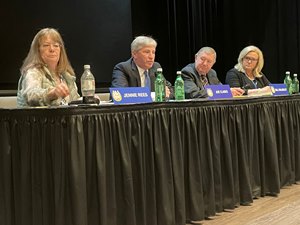HBPA Panel Offers Advice on Engaging With Lawmakers


As government affairs consultant Joe Clabes sees it, when horse racing conducts industry days on state capitol steps it's perfectly all right for many of racing's participants to show up in jeans.
"It's OK if there's a cowboy hat or two and big belt buckles," Clabes noted during a panel discussion on how horsemen can interact and build relationships with lawmakers March 3 during the National Horsemen's Benevolent and Protective Association conference at the Oaklawn Park hotel in Hot Springs, Ark.
Clabes, who has lobbied for the Kentucky industry and the Kentucky HBPA, said seeing that everyday fashion helps remind lawmakers that while racing may be the Sport of Kings, there are plenty of people going to work each day to make a living in the sport and the ancillary businesses that keep it up and running.
Panel member Angel Moore, an attorney who represents the Mountaineer (W.Va.) HBPA, said it is important to educate lawmakers about the livelihoods tied to horse racing.
"We're not the sport of kings. That image is something that we struggle with in West Virginia," Moore said. "People think, 'Oh, they own Thoroughbreds; they have money.' It's a very difficult notion to overcome unless you have racing families and people in the communities telling a different story."
In terms of ways to convey that story, panel members said it's important to stay engaged. Clabes noted that while legislators are often very busy during session, they have more time the rest of the year. He also noted that during meetings in this time of the year bills often begin to take shape.
"It's important that you're engaging year-round and being in contact with your legislators as individuals and not just showing up during the session when everybody in the state is there trying to get some time with legislators," Clabes said. "They may view that as, 'Here's another person trying to get a message to me or trying to get an appointment with me.'"
Clabes noted that lawmakers may not have the time to fully consider your message once a session starts. Beyond staying engaged throughout the year, he noted that horsemen should be active in community groups like Rotary and social groups as a way to potentially educate lawmakers and community leaders about the racing industry in a less formal setting.
Panel member Bill Walmsley, president of the Arkansas HBPA and a former member of the Arkansas state senate, said that if a horsemen's association finds a candidate that understands racing's interests, it should support that candidate's campaign. He said getting in early can mean a lot to a candidate.
"After I won the first time, a big insurance company sent me a check for $1,000," Walmsley said. "You know I never did anything for them or cared anything about it. Those $50 contributions I got while I was running—before I won—meant more to me than that $1,000 after I won."
Moore said Mountaineer HBPA has had success in inviting lawmakers to days at the races or on the backstretch. She noted that when the HBPA saw a lot of women earning seats in state office, the HBPA decided to specifically reach out to these new lawmakers. The HBPA launched a "women in racing" day to facilitate meetings.
"We thought that we weren't focusing on the women coming into office and this day would offer us an opportunity as women in the industry to speak with them directly," Moore said of the program that also includes the Charles Town (W.Va.) HBPA. "We just thought it was a good opportunity to reach out to them."
